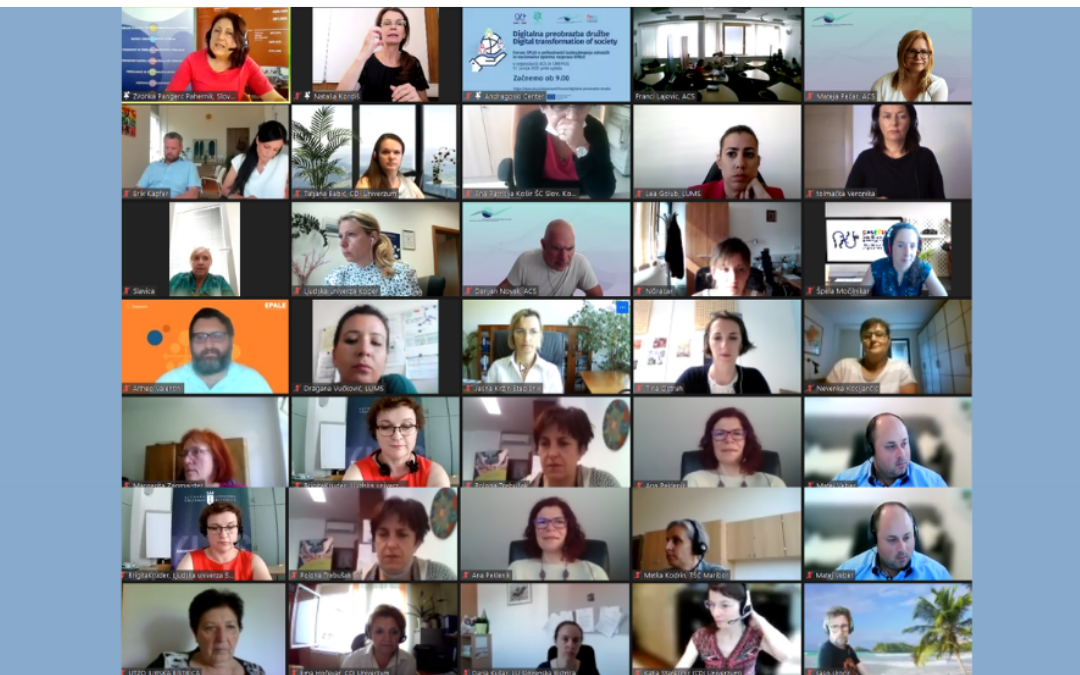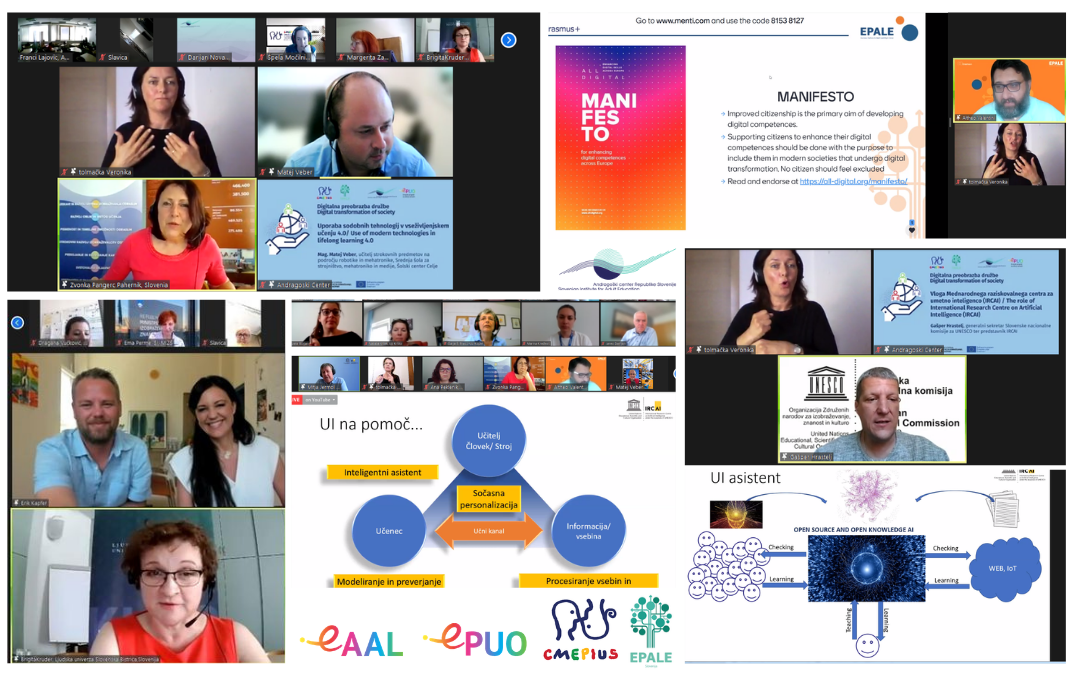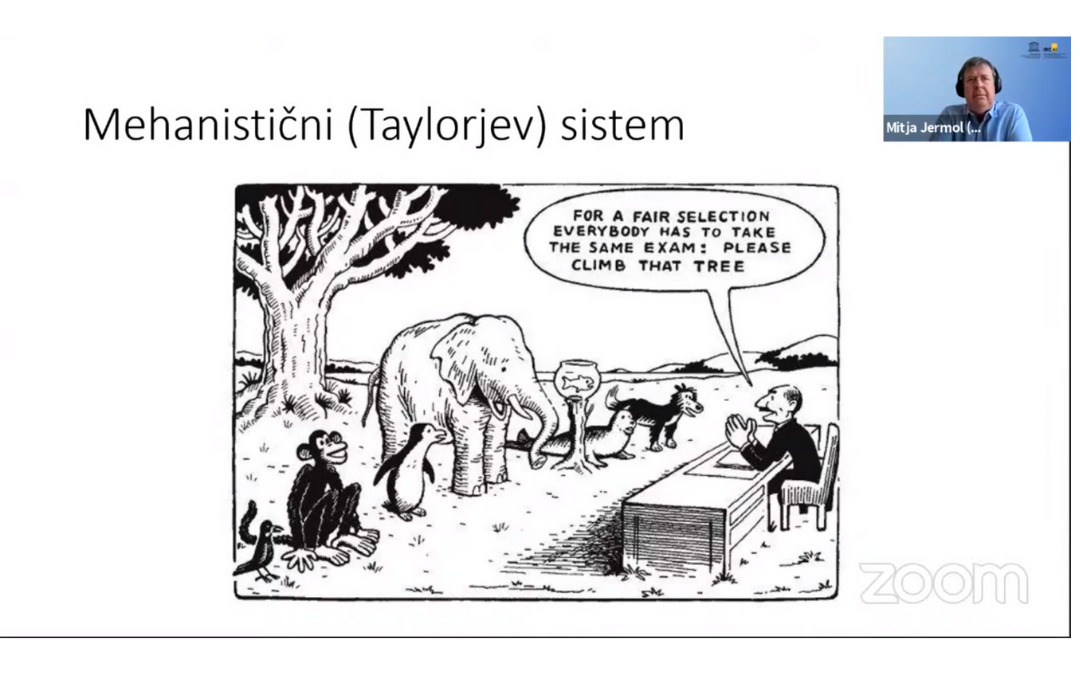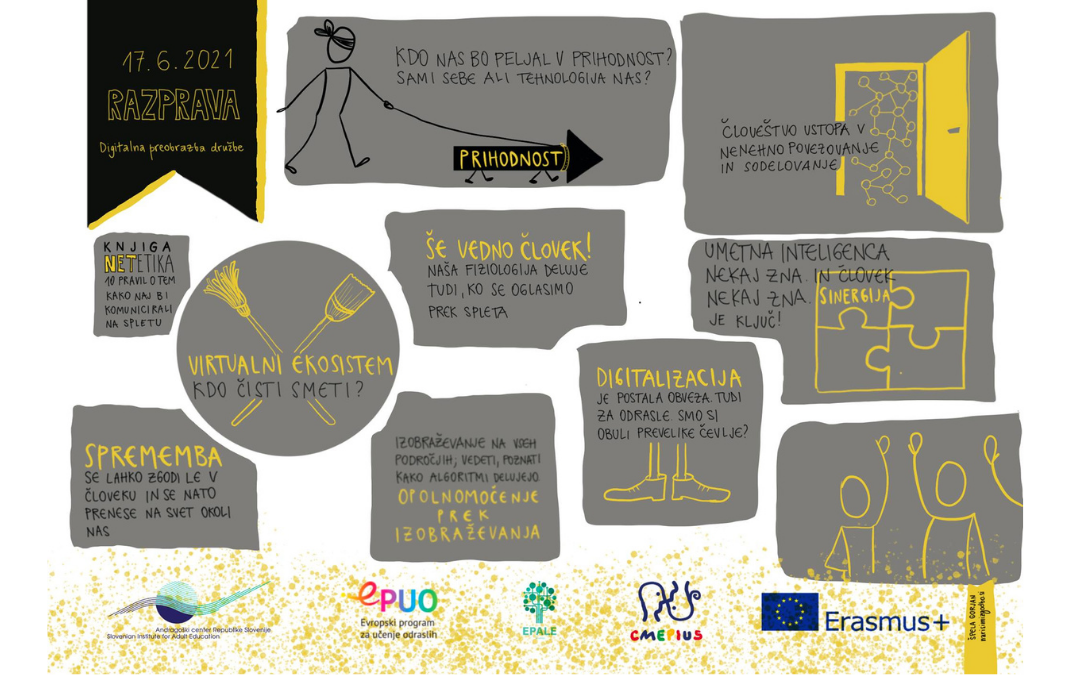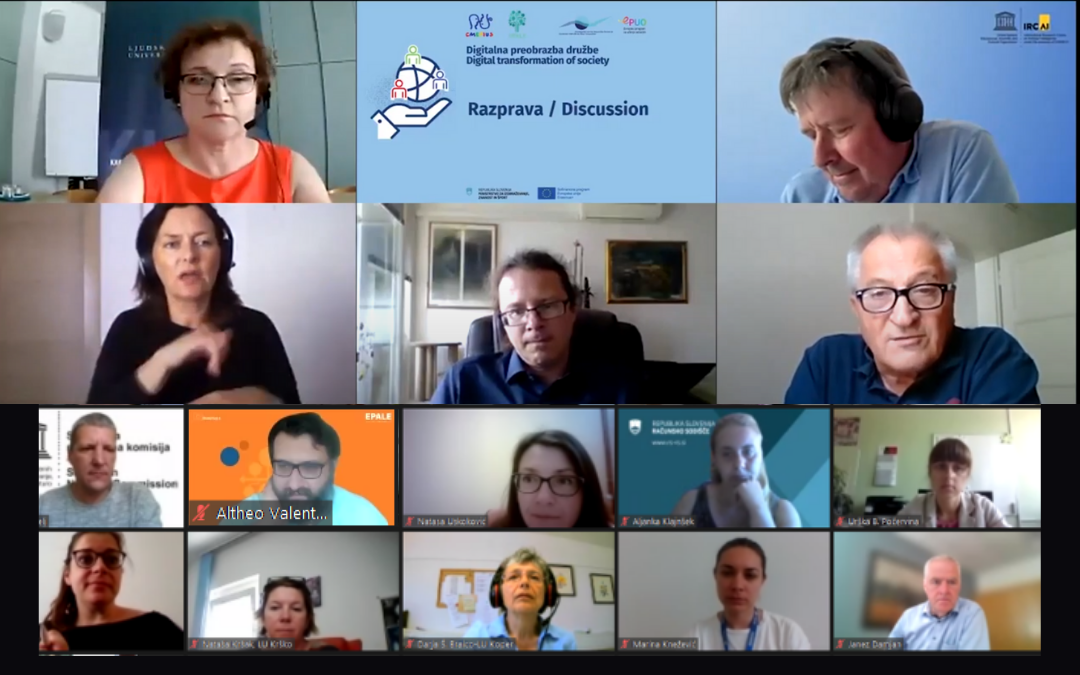The EAAL project unravels the themes associated with education and broader social developments, encourages new connections, boasts with excellent programmes and projects, and addresses current challenges. This year’s first EAAL Forum (in Slovenian) was held in January in cooperation with Slovenian Philanthropy and the Sloga Platform. We concentrated on migrations and the challenges of multiculturalism (see article Learning is also a matter of heart and soul; in English).
Are we aware of the benefits that technology and artificial intelligence offer? Do we know how to sidestep their traps?
These two questions summarise a bunch of concerns and expectations of nearly 100 participants of the Second EAAL Forum which was carried out online on 17th June. The event was organized by the SIAE in cooperation with the EPALE National Support Service of Slovenia. In the second part we listened to the national discussion on digitalization. It was an interactive live event, which is an important upgrade of EPALE’s written online discussions.
This year, we have identified numerous advantages (as well as disadvantages) of teleworking and remote or online events. Each time there was an opportunity to add something new. This time we engaged interpreters in Slovenian sign language and Slovenian/English interpreters. The technology allows us to have the sign language interpreters visible on the screen all the time, and a participant decides whether to listen to the speaker or simultaneous interpretation. Check it out in the clip posted on our YouTube channel.
Over the past year and a half, we have been forced to use technology to a much greater extent, and the world’s regions are better covered by the signal thanks to the COVID-19 pandemic. Nevertheless, our literacy in this regard is still poor. What we have learned to use is only the ‘tip of the iceberg’, as the moderator of the 1st section of the event, the coordinator of the EAAL project in Slovenia, Zvonka Pangerc Pahernik from the SIAE said in the introduction. As she pointed out, the forum aims to look below the surface.
If we want to benefit from technology at work and in our daily lives, we must constantly learn
Keynote speakers complemented each other perfectly. The EPALE thematic coordinator from the Central Support Service Altheo Valentini spoke about matching digital transformation with current social transformative change. Participants were able to engage in the interactive presentation that he had prepared using the Mentimeter tool.
Altheo showed how to involve participants. It makes sense to include tablets, mobile phones and other devices in education just because we always carry them around. Who would play games if they could browse the lecturer’s notes and estimate the time the lecture will take?
He presented the All Digital project within which 25 centres will be opened and 42% of those who did not use the Internet before the pandemic will be supported. Formal and non-formal education programmes will be developed for them. Key approaches and recommendations were published in the Manifesto.
Artificial intelligence needs human knowledge and input
This sentence could summarise the lecture of Mitja Jermol, holder of UNESCO Chair on Open Technologies for Open Educational Resources and Open Education and head of the Centre for Knowledge Transfer at the Jožef Stefan Institute. He stressed that artificial intelligence is a collection of algorithms that cannot replace a teacher. They master systems of information that are too complex for the human mind, and they are submitted back to an individual in a simplified or tailored format. Applied artificial intelligence makes our lives easier, but it cannot replace us.
If we all piled up our knowledge, we could have it all. But since we are not capable of doing this, artificial intelligence walks in.
He placed particular emphasis on open educational resources. Each individual could publish one open educational resource and share it. Everyone would thus gain access to 7 million sources and obtain knowledge for free.
Personalised education and augmented reality
Both terms sound futuristic, don’t they? Matej Veber from SC Celje first used a video and then words to show how technology is employed in the teaching of both young people and adults. We saw real working robots playing football and doing other important (trivial) things. In the development of technologies and devices, participants develop many skills, not only digital: intercultural cooperation, foreign languages, communication. They enhance the visual information with a video recorded in a 360-degree technique. The use of augmented reality and other modern technologies is important in motivating participants. Moreover, cooperation with companies is also very essential. He announced personalised learning where artificial intelligence will be indispensable.
In the future, we will be faced with personalised lifelong learning in which the teacher will be a co-worker in the educational team.
IRCAI focuses on the use of artificial intelligence for general goods such as health
Gašper Hrastelj who went on to talk about the role played by the IRCAI also expressed his enthusiasm about what he had seen in previous presentations. He referred to the explanation of artificial intelligence as presented by Mitja Jermol. The centre is new and has gained worldwide fame with the Coronavirus watch application. The fact that IRCAI is located in Slovenia is the result of the tradition of developing artificial intelligence in our country, Slovenian knowledge and negotiations. The proposal was unanimously supported by 193 UNESCO member states.
Brigita Kropušek Ranzinger and Erik Kapfer presented the Pattern City of Velenje. It is an ecosystem for education, research, experimentation, prototyping and innovation. Today we are talking about cooperating and no longer just connecting. That is why they look after the proper flow of knowledge in the local community and beyond, which is only feasible with digital literacy in the broadest sense. Visitors to the Pattern City delve into abstract topics for which there is (yet) no room in the school.
What about ethics?
Sometimes we get the feeling that technology is leading us and not the other way around. We are tasked to make sure that this does not happen, as we are responsible for our own lives. On the other hand, there are social sciences, such as ethics. Luka Omladič says that ethics are “party breakers” as they place various restrictions on engineers who are discouraged from believing that anything is possible. Technology creates contact with experience, actions, practice, and moral choice. Time and time again, it brings new ethical concerns.
The title of this contribution is taken from this part of the event. Watch the clip and listen to the story associated with it, as well as many other picturesque cases.
The world of digitalisation is about man, not technology.
The national online discussion was moderated by Brigita Kruder from Slovenska Bistrica AEC. As a digitalisation enthusiast, she linked the first question to the habits of the modern individuals who sometimes feel like the administrators of their lives. They monitor the operations of the bank, the vacuum cleaner and at the same time receive various reminders from manufacturers and service providers about their (bad) habits. Do we even have a choice?
Luka Omladič’s answer was simple: the right path is empowerment through education and the democratic influence of society (including legislation).
How technology is produced is not morally questionable. How it is used by people is.
Mitja Jermol pointed out the advantages of technology provided through searching for information e.g. about the route. Data from our mobile phones allows us to be informed. We all contribute so that we all come away with something. Artificial intelligence handles the information that people post online. It puts up a mirror to us but when we spot negative and dark content in the reflection, we get scared and say that technology is not right.
Do we know how to use artificial intelligence to our advantage?
After all, the discussion also touched upon adult education. What about responsibility of individuals which digitalisation has further increased? Some individuals still lack basic education despite compulsory schooling. Research shows that our literacy skills are poor. Examples from practice have responded to these two concerns at least in part. Together with digitalisation, we also develop other (in particular interpersonal) skills: communication, respect, a sense of teamwork and reciprocity.
The event responded to many questions, leaving some of them open or raised. We will communicate the findings of the EAAL Forum and the EPALE discussions to the world in which we live, to our personal and professional lives. We encouraged networking and collaboration and motivated reflection. We will continue with the forums in the autumn. Zvonka Pangerc Pahernik announced further “peaks of the icebergs” that we will face: green transformation of society, active citizenship, an aging society, and the future of work.
Synergy between man and technology is not an issue, but a reality. In order to obtain a sound understanding of it, let’s learn, educate, collaborate and network. Let us incorporate new knowledge into our lives and the lives of our loved ones, and they will pass it on. Let’s learn what an iceberg looks like below the surface so we don’t drown due to ignorance.
Ana Peklenik (ana.peklenik@acs.si), ACS

